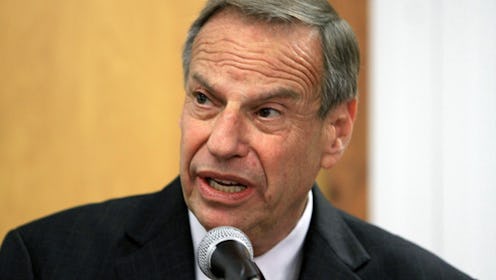News
Filner's Out: An Obit of His Career

It’s always too soon to write a political obituary — just ask Richard Nixon, or Mark Sanford, or Eliot Spitzer—but it wouldn’t be entirely unreasonable to suggest that Bob Filner’s political career is entirely finished. On Friday, the San Diego mayor signed his letter of resignation. We thought we’d look back at what exactly that career looked like, and how he functioned as both a public servant and a private citizen during his thirty-plus years in politics before it all came crashing down.
Filner may have spent a rather short time as San Diego’s mayor, but he’s spent a very, very long time in elective politics. In 1978, he attended a San Diego school board meeting to ask why they were considering closing the school his children attended. He was kicked out of the meeting, which prompted him to run for a seat on the board. He won that election, and became the board’s president a few years later. After a brief stint as a staffer in Congressman Jim Bates' office, Fulner was elected to the San Diego city council in 1987.
In 1992, he decided to take a shot at a newly-created House seat. This entailed running in a primary against his old boss, Jim Bates, who’d lost his seat two years earlier after several female staffers accused him of— wouldn't you know it — sexual harassment. Ironically, Filner reminded voters of Bates' alleged sexual harassment during the campaign, won the primary, and was soon elected to the House.
Filner, who was jailed in Mississippi in college for protesting southern segregation, was always a pretty liberal guy. In the House, he took up the issue of veterans’ interests, starting with benefits for Filipino veterans. Hundred of thousands of Filipinos fought in World War II, but the federal government reneged on paying them the stipends and health benefits after the war. Filner championed several pieces of legislation to rectify this, including a component of the 2009 stimulus that offered a $15,000 lump sum to Filipino veterans. He was largely successful in these pushes, and soon enough, veterans became Filner’s signature issue.
He was also known in the House for his constituent work, and would often pursue what are called “private bills”— legislation aimed not at changing broad federal policy, but rather helping individuals in difficult situations. For example, several of the bills Filner pushed allowed immigrants in his district avoid deportation. By one estimate, Filner passed more private bills during his time in congress than any of his colleagues.
But even before the sexual harassment allegations came to light, reports had surfaced that Filner was often bad at respecting boundaries.
In 2007, he allegedly became irate that his baggage hadn’t arrived yet at Dulles International Airport, and forced his way into an employee-only room at the baggage claim. This resulted in an assault charge (he supposedly pushed his way past an employee’s outstretched arm), which was eventually reduced to a trespassing charge. Filner had to pay $100 and write a letter of apology to the airport employee.
The publicity from the airport incident led to the unearthing of a 2003 case wherein Filner, after arriving at an immigration detention center to see a constituent, was told he couldn’t enter a restricted area. He allegedly responded by asking the officer if he’d ever read the Constitution, then threatening to have him arrested, and ultimately blowing past the security checkpoint anyway.
But neither of these were enough to derail Filner’s political career, and he resigned his House seat last year to run for the San Diego mayorship.
He won, but didn’t spend much time in office before the sexual harassment allegations came to light. During his tenure as mayor, he did declare the accumulation of bird droppings on the La Jolla coastline a public health emergency — they’d been stinking up the beach for the past year — and helped develop a plan to clean the mess up. He also focused on making San Diego’s roads more bike-friendly, and was apparently well-regarded by environmental activists in the area.
Filner was good at winning elections, and was in many ways an effective public servant. But his boorish personal behavior was inexcusable, and when the history books are written, it may overshadow his legislative accomplishments. If he makes the history books at all.